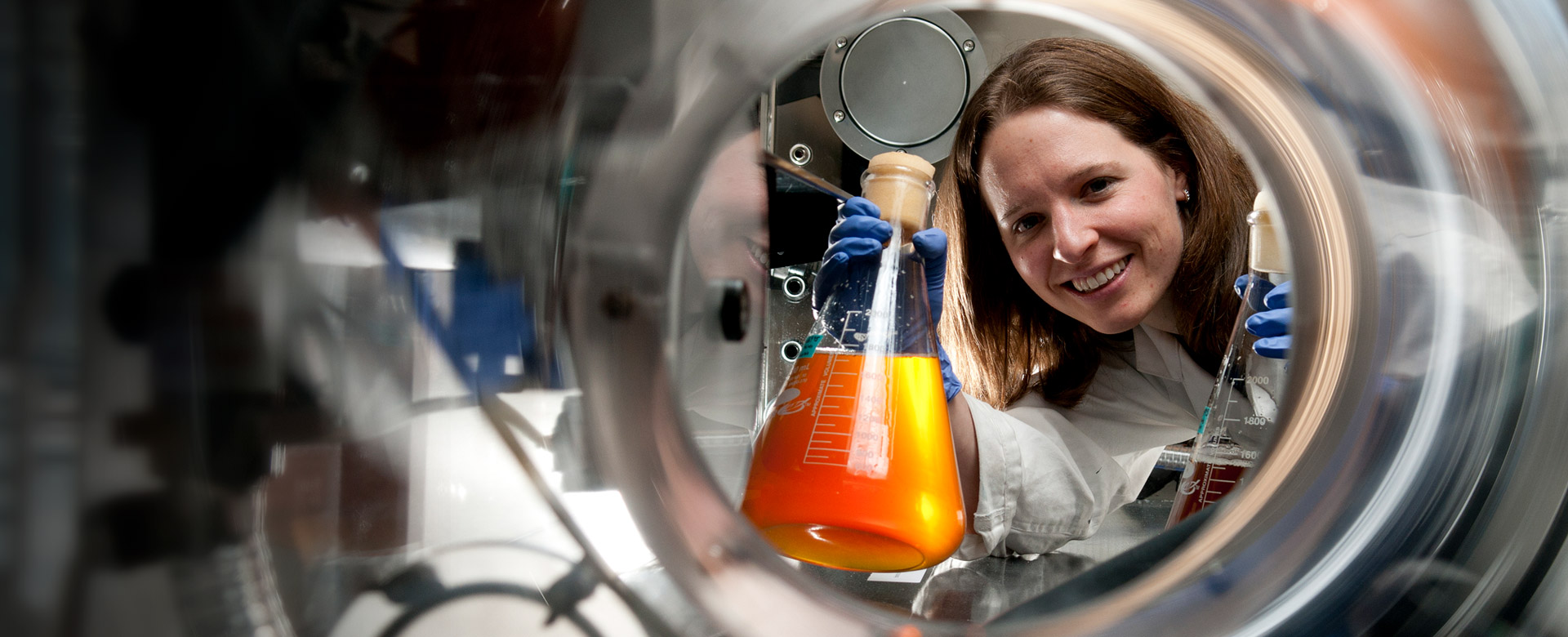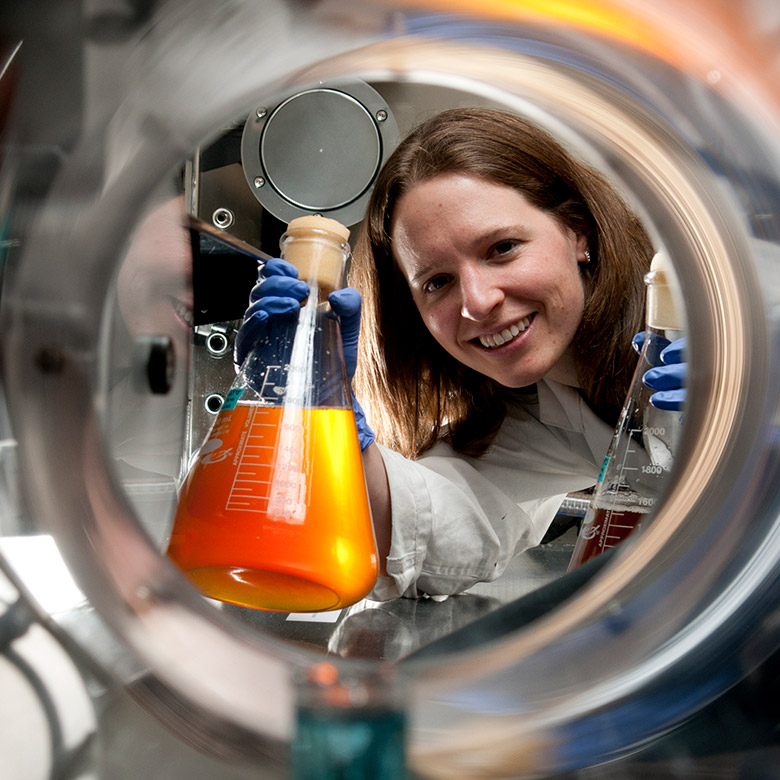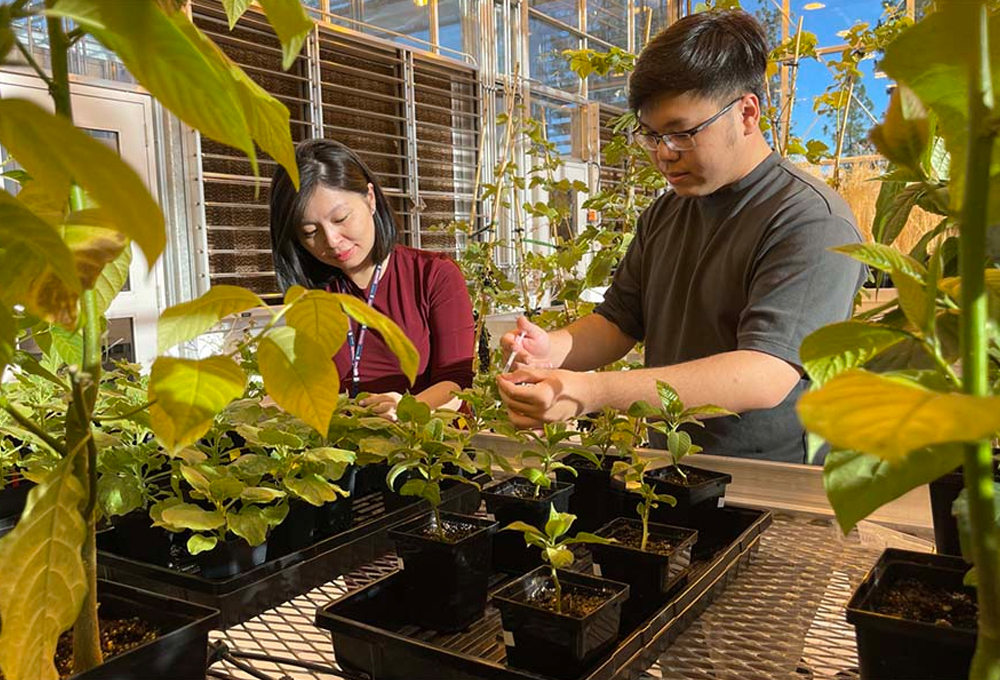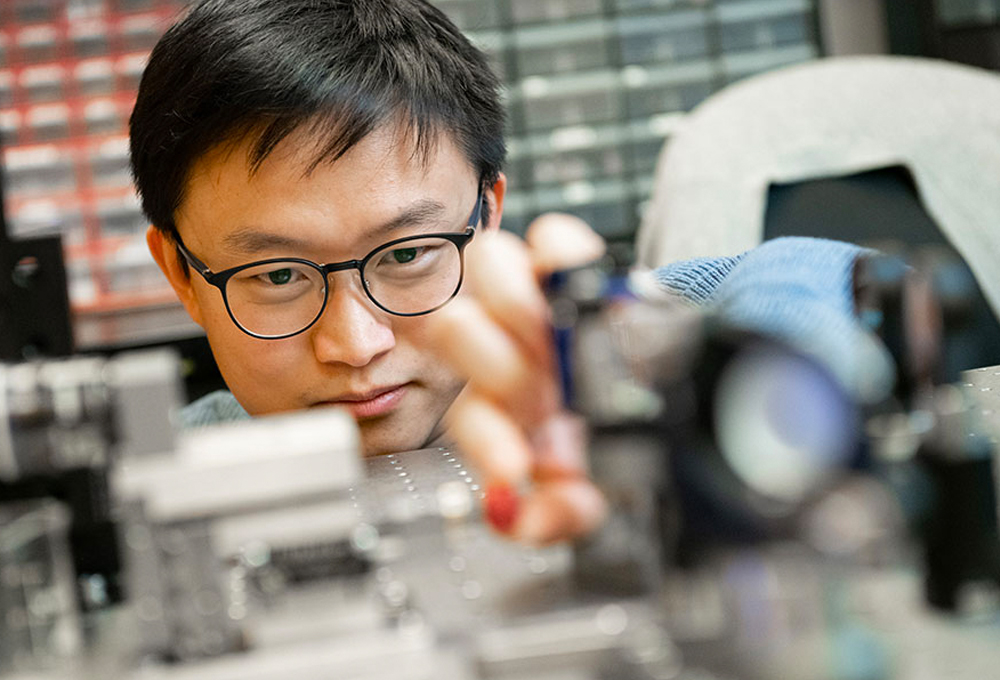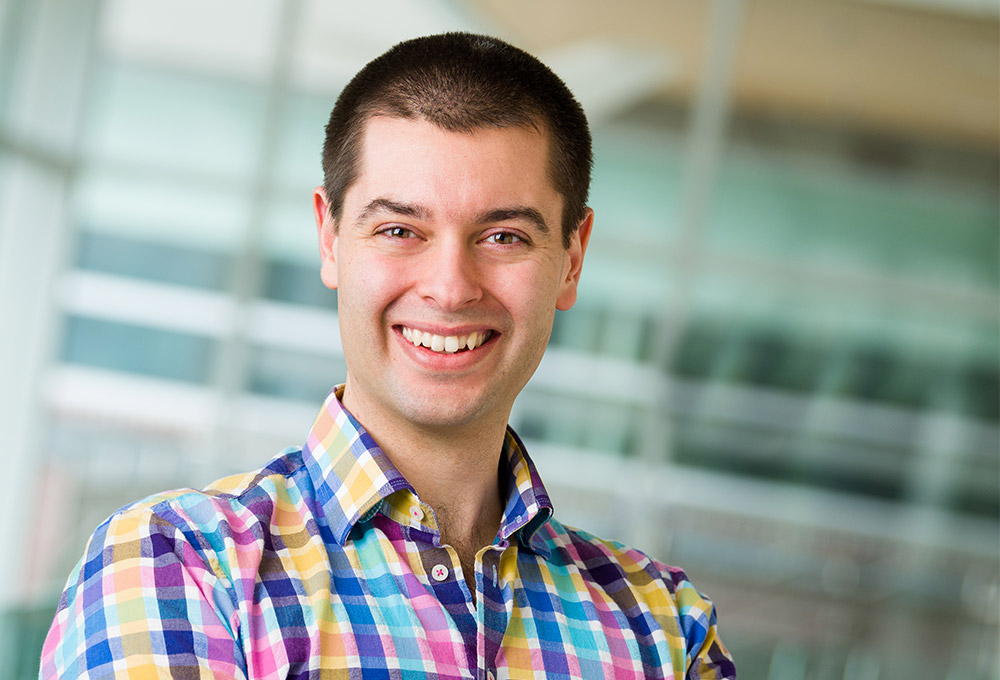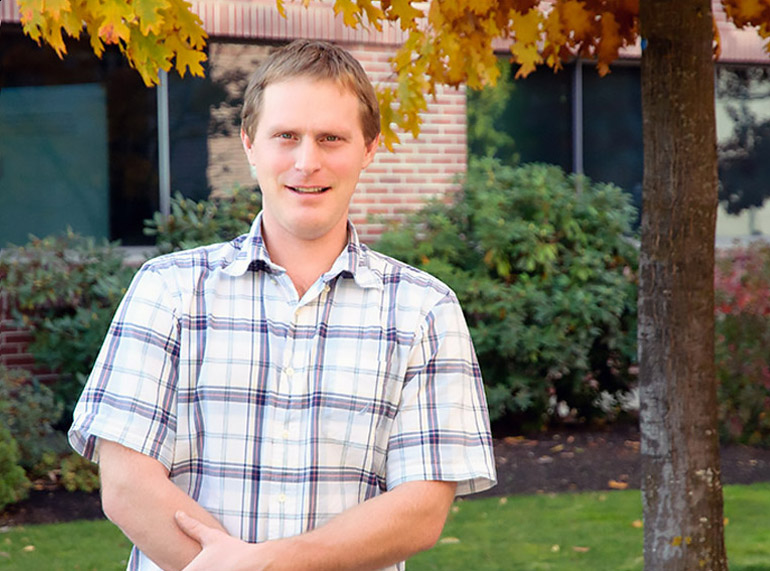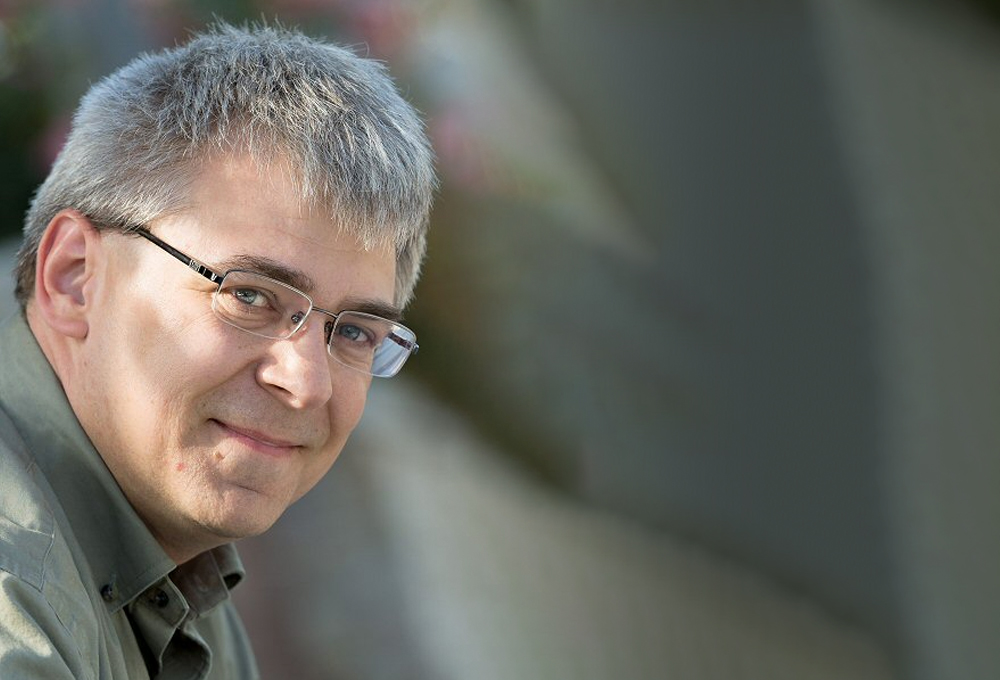Featured Faculty Researchers
Looking for anti-cancer compounds using plant by-products
It may surprise some, but many of the compounds used in modern-day medicine, including chemotherapeutic drugs, come from plants.
Thu-Thuy Dang, Assistant Professor of Chemistry and her research team in the Plant Bioactive Compound Research Laboratory have discovered a group of enzymes from the tropical tree Camptotheca acuminata, known as “happy tree,” that oxidize camptothecin, enabling the production of topotecan, irinotecan and other similar compounds. This discovery is particularly significant because it drastically reduces the amount of time and effort spent on anti-cancer compound derivatization and semisynthesis.
“Cancer is the leading cause of death in Canada, and having an opportunity to work towards a future with more available treatments and, ultimately, survivors, is a responsibility we take very seriously.” Learn more.
Thu-Thuy Dang | Assistant Professor, Chemistry
Studying a cell’s sense of touch through designer DNA
Assistant Professor of Chemistry Isaac Li’s current work focuses on developing force-responsive DNA nanostructures that can be used to study the physical interactions between cells. These interactions are key regulators in the development of organisms and diseases such as cancer metastasis.
“Being able to watch and control the actions of biological molecules, one at a time, is a fascinating and fundamentally important problem.”
With state-of-the-art single-molecule biophysics tools such as optical tweezers, an atomic force microscope, and single-molecule and super-resolution microscopes, individual DNA molecules can be designed and used to directly visualize how individual cell receptors experience mechanical forces.
Learn more.
Isaac Li | Assistant Professor, Chemistry
Quicker development and more effective solar energy conversion
Assistant Professor of Chemistry Robert Godin is exploring ways to convert solar energy technologies into hydrogen fuel cells to create more efficient energy storage. The technology could reduce greenhouse gas emissions and be used as a reliable renewable energy source for transportation and other industries.
“The potential of hydrogen fuel cells is immense, and the technology is only going to get better.”
The research is a significant contribution to the development of sustainable energy solutions and could drive innovation in the renewable energy industry, particularly in energy storage. Overall, the study is essential to achieving a greener and cleaner future. Learn more.
Robert Godin | Assistant Professor, Chemistry
Testing for smoke taint in Okanagan wines
Associate Professor of Chemistry Wesley Zandberg is striving to better understand how to measure wines impacted by wildfire smoke as he has developed a testing method to assess the impact of smoke on wines, aiding winemakers in making informed decisions. The study emphasizes the importance of early detection to mitigate potential losses and protect the reputation of the region’s wines.
“Being able to test for smoke taint will be instrumental in helping winemakers make the best use of their crops and reduce financial losses.”
This testing method provides winemakers with valuable information about the presence and intensity of smoke compounds in their wines, ensuring industry resilience and maintaining consumer satisfaction. Learn more.
Wesley Zandberg | Associate Professor, Chemistry
Stephen McNeil receives 2023 West Coast Teaching Excellence Award
Associate Professor of Chemistry Stephen McNeil is a recipient of the 2023 West Coast Teaching Excellence Award, UBC Okanagan’s first recognition at these awards.
This Award recognizes Dr. McNeil’s longstanding dedication to learner-centred and inclusive teaching practices and his significant impact on the culture of teaching and learning at UBC Okanagan and beyond.
Throughout his celebrated career, Stephen McNeil has played a significant role in shaping and developing the Chemistry curriculum and transforming the learning environment at UBC Okanagan. He led an ambitious reform of the content, delivery, and assessment of UBC Okanagan’s first-year chemistry courses by introducing flipped delivery, guided-inquiry learning, small-group in-class work, collaborative two-stage assessments, and a curriculum framed within societally relevant contexts. Learn more.
Stephen McNeil | Associate Professor of Teaching
Research groups & Laboratories
Our research groups and laboratories form the foundation of our research efforts, where our faculty members work with a number of community and industry partners to advance knowledge and provide hands-on research and learning opportunities for students.
Plants produce hundreds of thousands of distinct small-molecule natural products, many of which are invaluable nutrients, commodity products, and therapeutics.
At the heart of the beautiful Okanagan Valley, Dang Group integrates biochemistry, chemistry, bioinformatics, and molecular genetics to elucidate and engineer the biosynthesis of valuable small molecules from medicinal plants. Our ultimate aim is to learn and to translate natural metabolism into innovative biotechnologies to meet the ever-increasing demands of high-value chemicals. Learn more.
Noncovalent interactions play a central role in determining structure and reactivity throughout chemistry and physics. Our group develops and applies computational methods to understand this role.
We also use computational chemistry techniques to study a wide variety of radical systems in chemistry, biochemistry and physics. Our current research focuses on quantum effects in enzymes that mediate radical rearrangement processes and on the potential for non-redox metal cations to act as a chemoprotective against radical damage through hydrogen atom transfer reactions. Learn more.
The group aims to make impactful contributions to worldwide efforts in developing affordable clean energy. Our main focus is understanding the photophysical and photochemical processes that dictate efficiency in solar fuel producing systems. Our advanced time-resolved optical spectroscopy techniques give us the insights necessary to understand the influence of key physical and chemical parameters, and optimize material synthesis with strong rational. Learn more.
We study the biophysics of cells at the single molecule and single cell levels. Our studies address fundamental cell biology questions that have many practical applications from smart DNA-based biomaterials to cell screening technology. Learn more.
The McNeil Research Group conducts chemistry education research by using our classrooms as our laboratories. We study the challenges associated with teaching and learning university-level chemistry and develop innovative learning strategies to address those challenges. Learn more.
The Menard lab works at the interface between chemistry and biology. We use small molecules to study and manipulate biological systems. The group provides a multidisciplinary environment where students and researchers work together to develop new chemical and biophysical tools for the study of living systems. Learn more.
PlantSMART investigates the chemicals produced by plants and how plant chemicals affect human health. Research themes include: chemistry of cannabis and other medicinal plants; plant chemistry for food security; chemistry of natural non-protein amino acids; chemical regulation of plant signalling behaviour; chemistry of plant responses to light. Learn more.
The Pranckevicius Group will perform research at the boundary between organometallic and main-group chemistry, with an eye to the development of new catalysts and materials that are based on principles of sustainability. Learn more.
Our lab focuses on describing the chemistry of medicinal plants and bacteria to investigate the chemical differences between species and samples. This is used to discover biological activities, optimize natural health product formulation, identify adulterated products, and classify species by their chemistry. Learn more.
Earth-abundant transition metal catalysts that operate under mild conditions will be required for valorization of renewable resources and more sustainable organic synthesis. The Smith research group has explored metal-mediated radical reactions based on reversible homolysis of chromium-alkyl bonds in well-defined organometallic complexes. Learn more.
Our favourite domain of chemical space is right between molecules and materials. We use the full repertoire of computational chemistry techniques that we supplement with X-ray absorption spectroscopic measurements in various chemical structure/property/reactivity investigations as highlighted on the research group website. Please visit elementologia.org.
Enzymes are large macromolecules that serve as biological catalysts for an immense number of biochemical reactions. We explore how enzymes can serve as valuable tools for the synthesis of new drugs and other high commodity chemicals, and also lead to the treatment of diseases, including bacterial infections, cancer, and metabolic disorders. Learn more.
A key objective of our lab is to combine capillary electrophoresis (CE) and mass spectrometry (MS) into a sensitive and high resolution method for glycan analysis. As a complement to the development of improved hyphenated analytical methods, we are also interested in devising more efficient sample preparation techniques. We also explore the roles played by glycans in diverse biological phenomena. Our lab members: investigate the effects of known chemical inhibitors of glycan processing enzymes; synthesize and test new inhibitors; devise assays to explore the functions of glycan biosynthetic enzymes; develop new methods for identifying glycan-binding proteins and their target. Learn more.
Learn more about Collaborative Research in the Irving K. Barber Faculty of Science.
Research Themes
Multidisciplinary research is essential to understanding the interconnected and complex issues we face today. Our researchers work together from various disciplinary backgrounds, and both undergraduate and graduate students are encouraged to participate in these collaborations.
Chemistry
- Advanced Microscopy and Spectroscopy
- Biochemistry and Biophysics
- Catalysis and Green Chemistry
Chemistry, Engineering and Health Sciences
- Exosome Biology and Liquid Biopsy
Chemistry and Biology
- Glycobiology and Glycomics
- Plant and Natural Product
Chemistry and Engineering
- Neural Chemical Biology and Mechano-Biology
- Solar Energy Storage
- Theoretical and Computational Chemistry
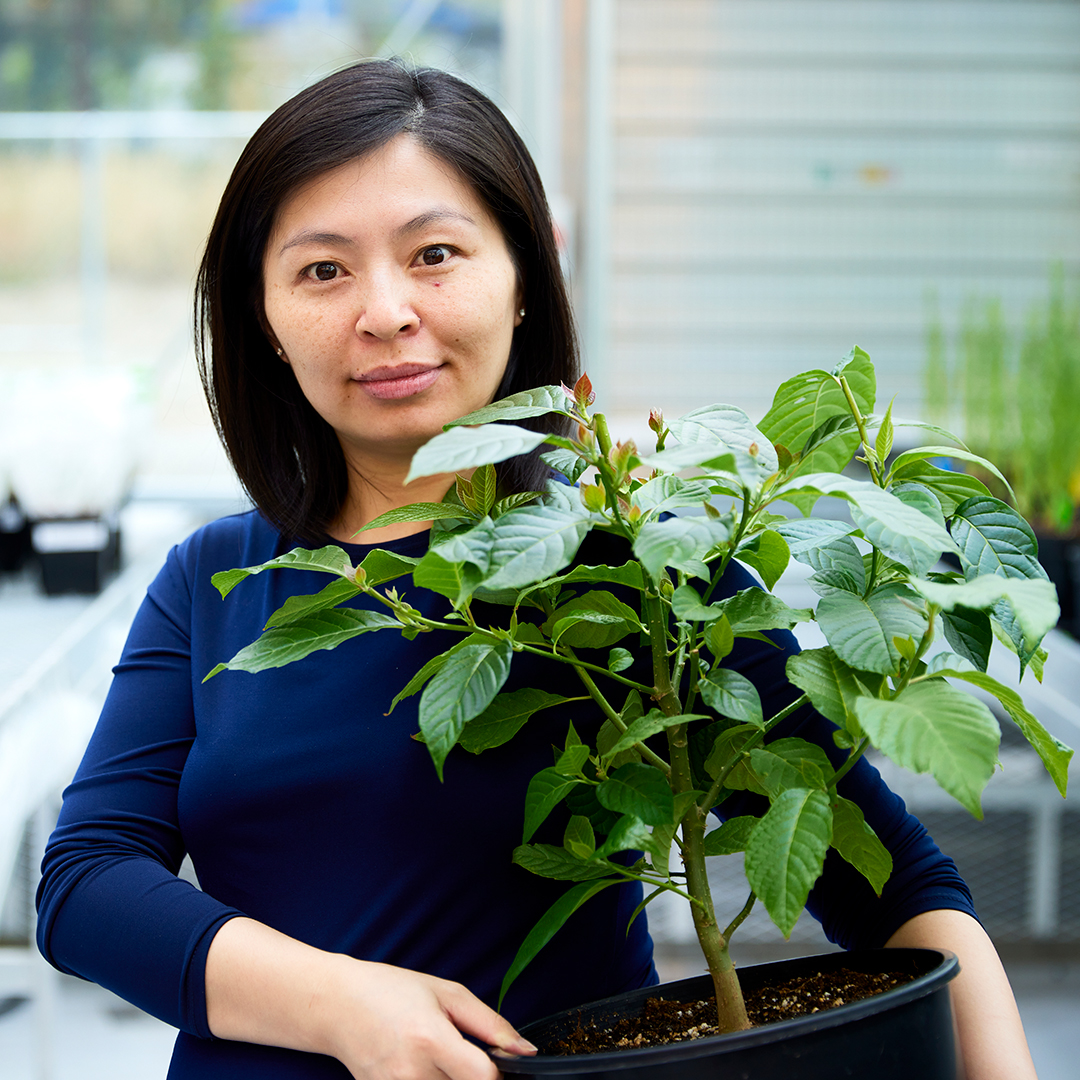
Experts
Search the Irving K. Barber Faculty of Science’s experts guide for quick and direct access to research expertise in the Faculty.
Undergraduate Students
Research Opportunities
The Department of Chemistry offers many opportunities for undergraduate students to gain valuable research experience. You can participate in research either as a volunteer research assistant or through Directed Studies and/or Honours opportunities. Explore your options below.
The opportunity: Get experience helping faculty members, graduate students, or a mixture of the two, with their research projects. This is a non-paid, non-credit based opportunity that will give you the chance to participate in various elements of conducting research. The duties and length of the opportunity are determined by the supervising faculty member.
Prerequisites: Typically, no experience is required, but some research labs may require students to have previous research experience. Some opportunities may also require the completion of certain courses prior to volunteering. Consult your program advisor or a faculty member for more information.
The opportunity: Carry out your own research project under the supervision of a faculty member in chemistry or biochemistry and molecular biology. You can earn three or six credits, depending upon the project.
Prerequisites: Varies by program. Refer to the Academic Calendar or consult your program advisor or a faculty member for more information.
The opportunity: Investigate a research problem under the supervision of a faculty member. You will be involved in all aspects of the research process, such as research design, data collection, and data analysis. Presenting findings is another key component of research, and this option requires completion of a written report, a public poster presentation, and a public thesis defence.
Completion of the undergraduate honours thesis contributes six credits towards your degree, but does not guarantee an honours distinction. To receive the honours distinction, you will also need to satisfy all of the graduation requirements.
Prerequisites: Fourth-year standing, a minimum average of 76% in all courses taken related to the major, a research supervisor, and approval of the Chemistry Curriculum Committee. Consult your program advisor or a faculty member for more information.
Research Awards
The Department of Chemistry and the Irving K. Barber Faculty of Science offer several awards to support exceptional research experiences for undergraduate students at UBC Okanagan.
The Undergraduate Research Awards (URA), Natural Sciences and Engineering Research Council of Canada Undergraduate Student Research Award (NSERC USRA), and other awards available through the department all provide opportunities for undergraduate students to pursue innovative and original research as part of their learning experience.
Our Partners and Donors
Together, we are making a difference, locally and around the world. Our partners and donors allow us to carry out our mission of helping the community, making advancements in psychological research, and providing quality education in the field of psychology.
If you are interested in becoming a partner or donor, we would love to hear from you.
